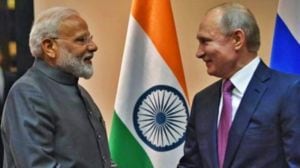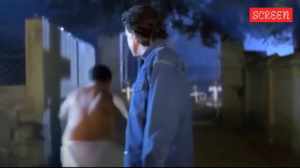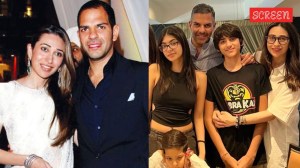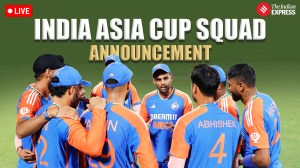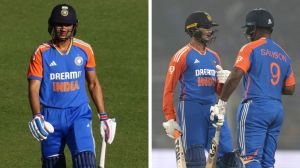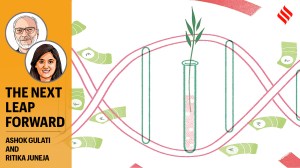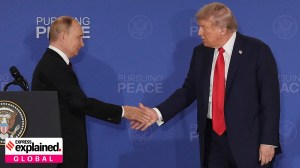Click here to follow Screen Digital on YouTube and stay updated with the latest from the world of cinema.
As Sidharth Malhotra-Parineeti Chopra’s Hasee Toh Phasee turns 10, here’s a call to revive romantic comedies in the Animal era
Revisiting Karan Johar's Hasee Toh Phasee makes you realise how love stories we once adored have been relegated to mere subplots in contemporary cinema. As our appetite for violence in films persists, it's time we refine our palate.
 Sidharth Malhotra and Parineeti Chopra's Hasee Toh Phasee was bankrolled by Karan Johar.
Sidharth Malhotra and Parineeti Chopra's Hasee Toh Phasee was bankrolled by Karan Johar. Imagine a lavish feast laid out before you, with over 10 chefs presenting an array of enticing dishes from across the country. Each dish appears unique and mouth-watering, yet as you sample each one, you can’t shake the feeling that they all taste oddly the same.
Similar is the state of Hindi cinema these days, where a multitude of entertainment options — from theatre releases to various OTT platforms — offer what seems like a diverse fare but turns out to be a repetitive diet of suspense, thrillers, action thrillers, suspense thrillers, thrilling thrillers and more. Different dishes, same taste.
The missing ingredient from this cinematic spread is soft romantic comedies, and as Hasee Toh Phasee turns 10 on Tuesday, this absence becomes more apparent than ever. Revisiting the Sidharth Malhotra and Parineeti Chopra-starrer was nostalgic and cathartic at the same time. When was the last time we witnessed the delightful journey of two unlikely individuals falling in love over the course of just two hours? Hasee Toh Phasee feels like Taylor Swift’s all-time favourite track “Love Story” turned into a feature film. Here we have Meeta, played by Parineeti, harbouring feelings for a guy, Sidharth’s Nikhil, whose heart she eventually wins thanks to quirks of fate.
What makes Hasee Toh Phasee unique is the character arc of its two lead characters. Meeta has an unwavering commitment to her dreams, despite the resistance from her traditional family. She is a genius, who prioritises her skill over family, love and even her own life. Similarly, Nikhil grapples with his own demons. He is a debt-ridden man whose impecuniousness doesn’t stop him from trying to prove himself to his thankless fiancee, who is also Meeta’s sister.
The convergence of these two child-like, stubborn characters, who refuse to conform to societal expectations, and their journey towards embracing their love is what gives Hasee Toh Phasee its profound emotional depth.
One scene, in particular, hits home: when Nikhil suddenly remembers locking Meeta in a room. He rushes to her, only to find her in a vulnerable state. Meeta, struggling with depression and other issues, sometimes acts out. But what’s heartwarming is Nikhil’s reaction — he embraces her like he is accepting all her flaws and making them his own. It’s moments like these that make Hasee Toh Phasee so touching, especially when paired with Vishal–Shekhar’s timeless music.
 Sidharth Malhotra and Parineeti Chopra in a still from Hasee Toh Phasee.
Sidharth Malhotra and Parineeti Chopra in a still from Hasee Toh Phasee.
Rewatching this film makes you realise how love stories we once adored have been relegated to mere subplots in contemporary cinema. Last year, only Karan Johar’s Rocky Aur Rani Ki Prem Kahani managed to secure a spot among the top ten highest-grossing films of the year. However, it leaned more toward family drama than a genuine romantic comedy. This also explains the huge popularity of K dramas in India. They fulfill the craving for heartwarming romantic stories that are sorely missing from Hindi cinema.
In a recent interview with indianexpress.com, Shahid Kapoor, who made a career from romantic comedies like Jab We Met and Ishq Vishk, but who has also recently dabbled in intense action thrillers like Bloody Daddy and Farzi, highlighted the challenge of finding fresh ideas in love story genre. “Love stories are the toughest to crack… it’s really hard to come across scripts that truly offer something new to the audience,” he confessed.
Hearing Shahid’s words also brings to mind Aamir Khan’s old interview that resurfaced after the release of Sandeep Reddy Vanga’s violent action drama, Animal. “Violence and sex are two emotions that are most easy to provoke in a human being,” he said. Though the clip is years old, Aamir’s words make a lot of sense especially today, making us wonder if filmmakers purposefully opt for sensationalism to grab our attention and make quick bucks.
However, the blame doesn’t lie solely with filmmakers; audiences share responsibility too. After all, the cinema you want is the cinema you get. In 2018, filmmaker Zoya Akhtar highlighted how cultural taboos surrounding romance in India contribute to our obsession with love stories. “Love is still a taboo in our culture. We’re still not completely allowed to have love marriages, there are restrictions on dating. Your parents still decide who you get to spend the rest of your life with. The ultimate fantasy in India is to see a boy or girl fall in love and end up happily, no matter what sort of opposition happens in their life. Love stories will always be big in our films, till our culture changes,” she said.
It could be that we’re all swimming in so much love that we don’t feel the urge to watch it play out on the big screen. Or maybe, as a society, we’ve just become so accustomed to violence that we have started relishing it. While things seem to lean more towards the second option, it’s high time we refine our palate.


Photos
Photos
- 01
- 02
- 03
- 04
- 05













